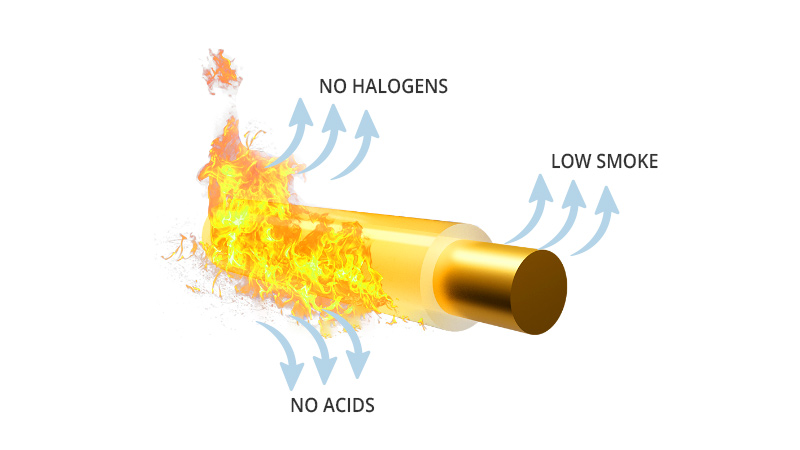LSZH
What is LSZH?
Low Smoke Zero Halogen (LSZH) is a material for wire sheathing. LSZH sheathing is composed of thermoplastic or thermoset materials that have low smoke emissions when heated and do not contain halogens.
Most network cable coverings comprise polyethene, polyvinyl chloride or thermoplastic polyurethane. In the event of a fire, chlorinated plastics release toxic hydrogen chloride, which produces hydrochloric acid when in contact with water. LSZH materials do not release hydrogen halide or other acids in the event of a fire.
LSZH materials reduce the toxic, corrosive gases produced when they burn. They are often used in poorly ventilated environments such as airplanes, train cars, or ships. They are also commonly used in the railroad industry, where there are high-voltage lines under the railroad or signal lines that transmit the location of trains. The use of LSZH also reduces the accumulation of toxic gases when lines are damaged by fire or short circuits.
Like in the railroad or shipbuilding industries, one of the essential needs is to protect the personnel and equipment from coming into contact with toxic, corrosive gases. These occasions will require using LSZH materials in the wire and cable jacket.

Advantages of LSZH Cables
Low Smoke Emission: LSZH cables produce less smoke when burning, which can dramatically increase visibility in a fire situation, thus buying more time for evacuation and rescue efforts.
Halogen-free emissions: LSZH cables do not release toxic halogen gases (e.g. chlorine, fluorine, etc.) during combustion, which not only reduces hazards to the human body but also reduces corrosion of equipment and protects the safety of electronic equipment and communication systems.
Environmentally friendly: Since LSZH cable does not contain halogenated materials, it produces fewer pollutants after burning, so it is more friendly to the environment and meets the requirements of green environmental protection.
Safety: LSZH cables are especially suitable for places with heavy human traffic, such as data centres, hospitals, shopping malls, and transportation hubs. These places have a high demand for fire prevention and poisonous gas protection, and using LSZH cables can significantly improve their safety.
PVC vs LSZH, What is the Difference?
Polyvinyl chloride, or PVC, is the world's third-largest production of synthetic polymer plastics, with an annual production of about 40 million tons. PVC is a polymer made from the polymerization of vinyl chloride monomer (VCM) in the initiator such as peroxide, azo compounds, etc., or under the action of light and heat in accordance with the mechanism of the free-radical polymerization reaction. It is also a common cable material, so what is the difference between PVC and LSZH material?
Materials and Composition: PVC sheathed cables are made from PVC, which offers good durability and flexibility. When burned, this material releases toxic hydrogen chloride gas and produces large amounts of smoke. In contrast, LSZH sheathed cable consists of a polyolefin compound that does not release halogenated gases when it burns, produces less smoke and is less toxic. This material is designed to minimize hazardous substances in the event of a fire and is more environmentally friendly.
Safety: In the event of a fire, PVC-sheathed cables lack safety, as releasing toxic fumes may increase the risk of poisoning and asphyxiation. LSZH sheathed cables are safer as they produce less smoke when burning and are halogen-free, significantly reducing the release of harmful gases and making them friendlier to the environment and the human body.
Application Scenario: PVC sheathed cables are usually used in situations that do not require high fire safety, such as piping inside buildings, walls or underground laying and other general environments for cable wiring. LSZH sheathed cables are often used in crowded or closed environments such as data centers, hospitals, public buildings, subways and airplanes due to their excellent safety. They are especially suitable for places with strict fire safety requirements.
Cost: PVC sheathed cables are a common choice for many general wiring projects due to their relatively low cost. Despite the relatively high cost of LSZH sheathed cables, their excellent safety and environmental performance give them a clear advantage in specific applications and make them the preferred material for situations where safety and environmental protection are more important.












